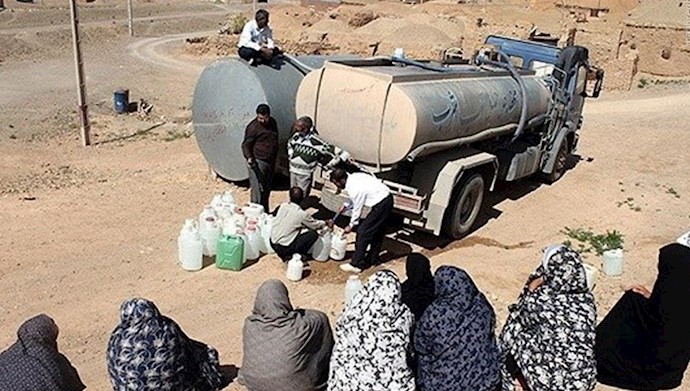Analysis by PMOI/MEK
Iran, July 26, 2018 – These days, during the height of the scorching summer season, the people of Khuzestan Province in southwest Iran are facing severe water shortages, especially in the cities of Abadan and Khorramshahr.
The irony is this province enjoys the luxury of several large rivers, including Arvandrood, Karoon, Bahmanshir, Jarahi and …
To understand the root cause, we need to take a look at the figures behind the scene and how this crisis came about. Furthermore, massive profits are being made by the authorities involved in exporting this water.
15 years ago the Iranian regime Energy Minister Habibollah Bitaraf in President Mohammad Khatami’s cabinet signed an agreement with his Kuwait counterpart, Sheikh Ahmed al Jaber al-Salah on December 13, 2003, to export 900,000 cubic meters of drinking water to Kuwait, according to Jam-e Jam daily.
Bitaraf explained that for the next 30 years Iran will transfer 300 million cubic meters of surplus drinking water to Kuwait. He called it a turning point for bilateral relations between the two countries. He further added it could go as high as 320 million cubic meters per year.
The pipe used for this purpose was 500 kilometers long and 150 kilometers of runs under the Persian Gulf. The budget was estimated at $2 billion. Many experts warned against this project, adding it would result in a shortage and drought inside Iran. Such warnings fell on deaf ears.
For another 15 years, Karun River waters will be pumped at a rate of 10,000 liters per second to Kuwait.
In 2007, the then Iranian regime Foreign Minister Manouchehr Mottaki reiterated his government’s commitment to this project at a joint press conference with his Kuwait counterpart.
This is still not the entire story.
It was later revealed that since 2009 the Iranian regime has also been sending drinking water to Iraq. The commitment was set at 120,000 cubic meters of water to Basra.
This amount was to be shipped by cargo ships, trucks and underground pipes with any oversight or even approval. According to the agreement’s text, which has no expiry date, every other day over 650,000 liters of drinking water is shipped to the Iraqi port of Faw.
When asked about the contractors of this project, the Iraqi prime minister Nouri al-Maliki said, “I cannot reveal the names of the Iranian contractors.”
Now that severe water and power shortages have caused such disasters in Khuzistan Province of Iran, Ali Sari, a so-called MP from Ahvaz, and Mostafa Shabeh, a local head of natural resources, are flatly denying the entire project.
The irony is that at the same time Basra Governor Shaltah Aboud said in an interview with Iraqi newspapers, “If it wasn’t for Iran we would have perished due to lack of water… We recently imported 70 trucks of water from Iran.”
Another video aired by the Iraqi “Baladieh” network shows Iranian regime Foreign Minister Mohammad Javad Zarif at a ceremony signing documents regarding Karun River water transfer for drinking, agriculture and other purposes to Iraq’s Basra Province.
China’s CCTV network also broadcast a report posted by the Associated Press regarding the transfer of water from Iran to Iraq, starting with 560,000 liters of drinking water, under a joint agreement.
The Revolutionary Guards is behind all these news reports and treasonous contracts, with senior officials pocketing huge amounts of profits. The Khatam al-Anbia entity controls the water exporting mafia in Iran.
This sheds light on the harassment, imprisonment and even killings of local environmentalists in Iran who were shedding light into this vast network of illegal exports.
Following the uprising in Khorramshahr in southwest Iran, the ruling regime was forced to temporarily shut down these exports. This, however, was only a temporary matter.
This has already resulted in the Iraqi people’s protests. The question is to what extent is the Iranian regime willing to maintain its influence in Iraq at the expense of the Iranian people.
This is the impasse Iran’s regime is facing as we speak.





